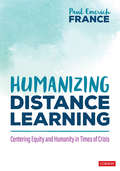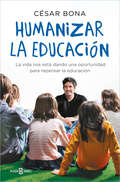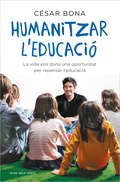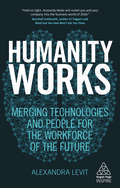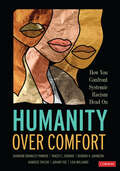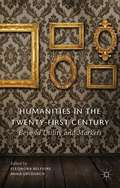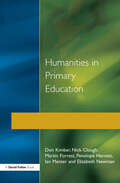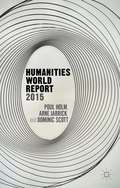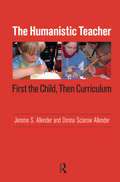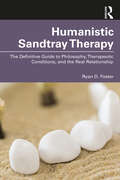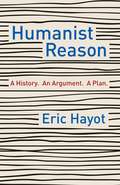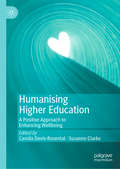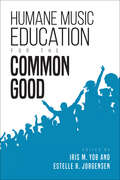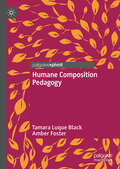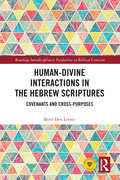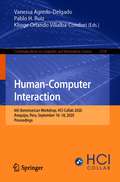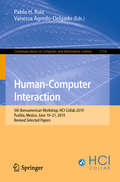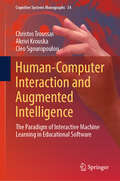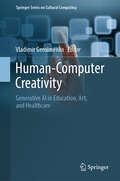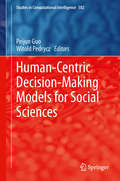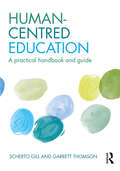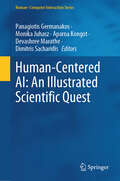- Table View
- List View
Humanizing Distance Learning: Centering Equity and Humanity in Times of Crisis
by Paul Emerich France"In some ways, shouldn′t we always be teaching from a distance?" Paul France asks this not as pitch for distance learning. But because part of the reason distance learning has been so challenging, Paul asserts, is that we’re replicating long-standing practices that promote dependent learning in our students. Why not use this unique moment of time to reconnect with the true purpose of teaching: to help our students become liberated learners and free thinkers? The next logical step in teachers’ months-long distance learning "journey," Humanizing Distance Learning describes how to center humanity and equity in our process of reimagining learning. Even while teaching and learning miles apart through screens, you’ll discover how to Build independence within your students so they’re better equipped to tackle challenges with persistence and learn how to learn Make collaboration and human connection essential components of your pedagogy, offering students the chance to socialize and learn from one another Center and unpack students’ identities, helping them develop a conscious knowledge of themselves, all the while using their self-identified strengths to overcome any obstacles Plan, prepare, and implement humanized instruction while teaching for student liberation—both digitally and in person. Investigate technology integration, including the Digital Divide, as well as ways to minimize EdTech integration so that our collective sense of humanity can continue to be front and center "The future," Paul writes, "may be unclear, the road may be rocky, and the story may continue to be long and winding as we push forward through this global crisis. But the answer will always be simple: We must teach and learn in pursuit of a deeper sense of collective humanity—and for no other reason." "This book is equal parts visionary and practical, courageous and invitational. It addresses foundational needs and wrenching challenges teachers faced during the recent time when U.S. teachers abruptly found themselves teaching remotely. . . . It is a deeply humanizing book." ~Carol Ann Tomlinson, William Clay Parrish, Jr. Professor Emeritus, University of Virginia "Humanizing Distance Learning is a book for our times not only because it addresses how to build a culture of thinking and teach for understanding at a distance, but also because it challenges the status quo of education by offering a more liberated and humane vision." ~Ron Ritchhart, Senior Research Associate, Harvard Graduate School of Education "Paul France has produced a timely and necessary book that will help educators humanize distance learning. Recognizing incredible dimensions of complexity, this book will surely help educators traverse times of uncertainty in distance learning."</spa
Humanizing Distance Learning: Centering Equity and Humanity in Times of Crisis
by Paul Emerich France"In some ways, shouldn′t we always be teaching from a distance?" Paul France asks this not as pitch for distance learning. But because part of the reason distance learning has been so challenging, Paul asserts, is that we’re replicating long-standing practices that promote dependent learning in our students. Why not use this unique moment of time to reconnect with the true purpose of teaching: to help our students become liberated learners and free thinkers? The next logical step in teachers’ months-long distance learning "journey," Humanizing Distance Learning describes how to center humanity and equity in our process of reimagining learning. Even while teaching and learning miles apart through screens, you’ll discover how to Build independence within your students so they’re better equipped to tackle challenges with persistence and learn how to learn Make collaboration and human connection essential components of your pedagogy, offering students the chance to socialize and learn from one another Center and unpack students’ identities, helping them develop a conscious knowledge of themselves, all the while using their self-identified strengths to overcome any obstacles Plan, prepare, and implement humanized instruction while teaching for student liberation—both digitally and in person. Investigate technology integration, including the Digital Divide, as well as ways to minimize EdTech integration so that our collective sense of humanity can continue to be front and center "The future," Paul writes, "may be unclear, the road may be rocky, and the story may continue to be long and winding as we push forward through this global crisis. But the answer will always be simple: We must teach and learn in pursuit of a deeper sense of collective humanity—and for no other reason." "This book is equal parts visionary and practical, courageous and invitational. It addresses foundational needs and wrenching challenges teachers faced during the recent time when U.S. teachers abruptly found themselves teaching remotely. . . . It is a deeply humanizing book." ~Carol Ann Tomlinson, William Clay Parrish, Jr. Professor Emeritus, University of Virginia "Humanizing Distance Learning is a book for our times not only because it addresses how to build a culture of thinking and teach for understanding at a distance, but also because it challenges the status quo of education by offering a more liberated and humane vision." ~Ron Ritchhart, Senior Research Associate, Harvard Graduate School of Education "Paul France has produced a timely and necessary book that will help educators humanize distance learning. Recognizing incredible dimensions of complexity, this book will surely help educators traverse times of uncertainty in distance learning."</spa
Humanizar la educación: La vida nos está dando una oportunidad para repensar la educación
by César BonaLa vida nos está dando una oportunidad para humanizar la educación. La situación que hemos vivido ha mostrado los descosidos del sistema educativo y ha puesto de manifiesto lo alejado que este se halla de la realidad. Se ha desvelado la inflexibilidad del currículo: es este el que ha de adaptarse a la realidad, no al revés. Estos meses, al hablar de educación, los verbos que más se han escuchado han sido examinar y evaluar. Es la vida la que nos está poniendo a prueba, y lo que tenemos que evaluar es el sistema. Así que, en lugar de buscar diferentes respuestas a las preguntas de siempre, quizá debamos cambiar las preguntas: ¿qué herramientas necesitan los niños y las niñas? ¿Qué carencias encontramos en la educación que hemos recibido? ¿Servirá lo que hemos vivido para reflexionar o volveremos a la educación prepandemia como si nada hubiera pasado? Tenemos que aprovechar este momento para replantearnos la educación que queremos: si hay algo que está claro, es que todo comienza en la educación. Los lectores comentan...«César aporta autenticidad.» «Inspirador.» «Muestra que otra educación es posible.» «Altamente recomendable si quieres encontrar una razón o muchas para ser maestro.» «Contagia las ganas de trabajar mejor.» «Simplemente increíble.» «Totalmente recomendado a todos aquellos que trabajamos en el mundo educativo.» «Te hace reflexionar.»
Humanitzar l'educació: La vida ens dona una oportunitat per repensar l'educació
by César BonaLa vida ens dona una oportunidad per repensar l'educació. La situació que hem viscut ha mostrat les febleses del sistema educatiu i ha posat de manifest que es troba molt lluny de la realitat. S'ha revelat la inflexibilitat del currículum, que cal adaptar-lo a la realitat, i no a l'inrevés. Els verbs que s'han sentit més aquests mesos quan es parlava d'educació són "avaluar" i "examinar", i el que hem d'analitzar és el sistema. Així que, en lloc de buscar diferents respostes a les preguntes de sempre, potser hem de canviar les preguntes: quines eines necessiten els nens i les nenes? Quines mancances trobem en l'educació que hem rebut?Servirà el que hem viscut per reflexionar o tornarem a l'educació prepandèmia com si no hagués passat res? Hem d'aprofitar aquest moment per replantejar-nos l'educació que volem: si hi ha alguna cosa clara és que tot comença en l'educació.
Humanity Works: Merging Technologies and People for the Workforce of the Future (Kogan Page Inspire)
by Alexandra LevitThe professional landscape is transforming, and the only way to maintain competitive advantage is to maximize the unique skills of your workforce. In Humanity Works, bestselling author, global workplace consultant and futurist Alexandra Levit provides a guide to making the most of the human traits of creativity, judgement, problem solving and interpersonal sensitivity. Revealing what the 'robot takeover' will really look like, how talent and machines can work side by side and how you can make organizational structures more agile and innovation focused, this book will prepare you to lead organizations of the future.Humanity Works doesn't just explain the fascinating trends of the future of work; it condenses cutting-edge academic and business thinking to show what you can do about the future right now. Original, real-life case studies including Nestle, The Washington Post, Deloitte, and Pepsi combined with exercises and workplace tools will equip you for staying innovative and successful in the wake of major workplace disruption. Everything hinges on capturing the human edge in your organization.
Humanity Over Comfort: How You Confront Systemic Racism Head On
by Kendra V. Johnson Lisa N. Williams Sharone Brinkley-Parker Tracey L. Durant Kandice Wilson Taylor Johari ToeIncrease your racial equity capacity for transformational change The years 2020 - 2021 will be remembered for COVID-19 and racial injustice. COVID illuminated long-standing structural inequities. Increased media focus on police brutality helped fuel a protest movement that underscored the urgency of the moment. In schools, non-profits, and various business sectors, conversations about race and institutional racism are becoming increasingly common. However, most of these conversations are performative and do little to disrupt the status quo. The authors of Humanity Over Comfort aim to move beyond the transactional response of using only conversations to respond to structural inequalities. Alternatively, the authors advance tools that promote transformational change that eliminates the access and opportunity gaps for Black and Brown individuals. Written to cultivate awareness that increases racial equity capacity, this book will help readers Understand historical context and the influence of racism in shaping reality Engage in reflections that connect learning to personal experience Understand the Conscious Anti-Racist Engendering Framework (CARE), which draws from adult learning theory to build community in organizations Leverage one’s span of control to implement practices that incrementally work to dismantle systems of oppressions Direct their increased capacity towards dismantling racially predictable policies and practices Transactional responses to racism perpetuate marginalizing narratives and outcomes and do little to support the humanity of a community, including White members. This book will guide readers towards transformational change to build a system that supports the restoration of our collective humanity.
Humanity Over Comfort: How You Confront Systemic Racism Head On
by Kendra V. Johnson Lisa N. Williams Sharone Brinkley-Parker Tracey L. Durant Kandice Wilson Taylor Johari ToeIncrease your racial equity capacity for transformational change The years 2020 - 2021 will be remembered for COVID-19 and racial injustice. COVID illuminated long-standing structural inequities. Increased media focus on police brutality helped fuel a protest movement that underscored the urgency of the moment. In schools, non-profits, and various business sectors, conversations about race and institutional racism are becoming increasingly common. However, most of these conversations are performative and do little to disrupt the status quo. The authors of Humanity Over Comfort aim to move beyond the transactional response of using only conversations to respond to structural inequalities. Alternatively, the authors advance tools that promote transformational change that eliminates the access and opportunity gaps for Black and Brown individuals. Written to cultivate awareness that increases racial equity capacity, this book will help readers Understand historical context and the influence of racism in shaping reality Engage in reflections that connect learning to personal experience Understand the Conscious Anti-Racist Engendering Framework (CARE), which draws from adult learning theory to build community in organizations Leverage one’s span of control to implement practices that incrementally work to dismantle systems of oppressions Direct their increased capacity towards dismantling racially predictable policies and practices Transactional responses to racism perpetuate marginalizing narratives and outcomes and do little to support the humanity of a community, including White members. This book will guide readers towards transformational change to build a system that supports the restoration of our collective humanity.
Humanities in the Twenty-First Century
by Eleonora Belfiore Anna UpchurchThis collection of essays by scholars with expertise in a range of fields, cultural professionals and policy makers explores different ways in which the arts and humanities contribute to dealing with the challenges of contemporary society in ways that do not rely on simplistic and questionable notions of socio-economic impact as a proxy for value.
Humanities in Primary Education: History, Geography and Religious Education in the Classroom (Primary Curriculum Ser.)
by Ian Menter Penelope Harnett Nick Clough Don Kimber Martin Forrest Elizabeth NewmanFirst Published in 1995. Routledge is an imprint of Taylor & Francis, an informa company.
Humanities World Report 2015
by Poul Holm Arne Jarrick Dominic ScottThe first of its kind, this Open Access 'Report' is a first step in assessing the state of the humanities worldwide. Based on an extensive literature review and enlightening interviews the book discusses the value of the humanities, the nature of humanities research and the relation between humanities and politics, amongst other issues.
Humanistic Teacher: First the Child, Then Curriculum
by Donna Sclarow-Allender Jerome S. AllenderThe Humanistic Teacher: First the Child, Then Curriculum supports teachers and parents in their quest to provide the best possible education for each and every child. Meeting the needs of every child is the basic tenet of humanistic education, and this text explores both theory and practical methods for achieving this difficult goal. Using examples from their fifty years of experience as teachers, administrators, and researchers, the authors explain the importance of humanistic methods such as self-study of one's own teacher practice, working together with other teachers, and establishing realistic boundaries with children of all ages. The Humanistic Teacher enables teachers to meet the different needs of individual students and to become the educators they want to be.
Humanistic Sandtray Therapy: The Definitive Guide to Philosophy, Therapeutic Conditions, and the Real Relationship
by Ryan D. FosterHumanistic Sandtray Therapy: The Definitive Guide to Philosophy, Therapeutic Conditions, and the Real Relationship provides a comprehensive exploration of the underlying theory, necessary skills, and practical applications behind Humanistic Sandtray Therapy (HST) based on a person-centered gestalt model.This book takes a deep dive into a philosophically based system of sandtray therapy in which all elements of the HST approach are provided in great detail, from the nuts and bolts of creating a sandtray and structuring the experience based on client culture and counseling setting, to process-oriented issues.Written with a genuine human touch, invaluable materials such as an HST treatment manual and a weblink to videos of HST sessions with real clients are included to assist academics and researchers in designing HST treatment outcome studies.
Humanist Reason: A History. An Argument. A Plan
by Eric HayotAsk just about any humanist, and you will hear that the humanities are in a crisis. Facing utilitarian approaches to education, the corporatization of the university, plummeting enrollments, budget cuts, and political critiques from right, left, and center, humanists find themselves on the defensive. Eric Hayot argues that it is time to make a positive case for what the humanities are and what they can become.Hayot challenges scholars and students in the humanities to rethink and reconsider the work they do. Examining the origins of the humanist ethos in nineteenth-century Germany and tracing its philosophical roots back to Immanuel Kant, Hayot returns to the history of justifications for the humanities in order to build the groundwork for their future development. He develops the concept of “humanist reason” to understand the nature of humanist intellectual work and lays out a series of principles that undergird this core idea. Together, they constitute a provocative intellectual and practical program for a new way of thinking about the humanities, humanist thought, and their role in the university and beyond. Rather than appealing to familiar ethical or moral rationales for the importance of the humanities, Humanist Reason lays out a new vision that moves beyond traditional disciplines to demonstrate what the humanities can tell us about our world.
Humanising Higher Education: A Positive Approach to Enhancing Wellbeing
by Camila Devis-Rozental Susanne ClarkeThis book explores humanising practice within higher education (HE). It provides a fresh perspective by bringing together expert voices with empirical experience of humanising theory and practice in various areas of higher education, in order to influence and improve the way in which universities work.The book draws on Todres et. al’s humanisation framework, as well other relevant theories such as positive organisational scholarship, Vygotsky’s socio-cultural theory and socio-emotional intelligence. Topics include micro elements of humanisation such as transitions and the student experience, and macro elements such as the policy impact of humanising HE and sustainability. The authors demonstrate how a humanising approach can provide the catalyst for wider change and help to improve wellbeing in the community. This book offers an invaluable resource for scholars interested in teaching and learning in HE, and for HE practitioners and policy makers keen to develop a more human practice.
Humane Music Education for the Common Good (Counterpoints: Music and Education)
by Iris M. Yob and Estelle R. JorgensenWhy teach music? Who deserves a music education? Can making and learning about music serve the common good? A collection of essays considers the answers.In Humane Music Education for the Common Good, scholars and educators from around the world offer unique responses to the recent UNESCO report titled Rethinking Education: Toward the Common Good. This report suggests how, through purpose, policy, and pedagogy, education can and must respond to the challenges of our day in ways that respect and nurture all members of the human family.The contributors use this report as a framework to explore the implications and complexities that it raises. The book begins with analytical reflections on the report and then explores pedagogical case studies and practical models of music education that address social justice, inclusion, individual nurturance, and active involvement in the greater public welfare. The collection concludes by looking to the future, asking what more should be considered, and exploring how these ideals can be even more fully realized. This volume boldly expands the boundaries of the UNESCO report to reveal new ways to think about, be invested in, and use music education as a center for social change both today and going forward.
Humane Composition Pedagogy
by Tamara Luque Black Amber FosterHumane Composition Pedagogy (HCP) provides a pedagogical framework for reconciling the current disconnect between neoliberal higher education policies (sometimes called the &“business model&” of higher education) and the demand for kinder and more human-centered instruction. Humane education is a pedagogical model, with origins in secondary education, that considers emotional wellbeing, civic engagement, and intrinsic motivation as central to learning. The authors suggest that humane pedagogies can and should be adapted to higher education contexts, as a means of synthesizing literatures on the pedagogies of inclusion and care from noteworthy scholars including Jamil Zaki, Lisa Blankenship, Asao B. Inoue, Ruchika Tulshyan, and more. Without feeding a crisis narrative or calling for a complete systemic overhaul, HCP offers both an alternative to, and an act of resistance against, dehumanizing forces in today&’s colleges and universities. In exploring its three tenets–empathy, wellbeing, and belonging–the authors call for improved collaboration among key stakeholders (faculty, students, and administrators) to center the human experience in how we approach college instruction, thereby allowing universities to better fulfill their educational missions.
Human-Divine Interactions in the Hebrew Scriptures: Covenants and Cross-Purposes (Routledge Interdisciplinary Perspectives on Biblical Criticism)
by Berel Dov LernerThis book addresses central theological issues and biblical narratives in terms of a bold thesis regarding relations between God and humans: that the actions of God and the actions of humans are informed by independently valid moral viewpoints which do not entirely overlap. The author suggests that God’s plans and actions refl ect the interests and obligations appropriate to His goal of creating a worthy world, but not necessarily our world. In contrast, humans must attend to special obligations grounded in their dependence on their existing created world and in their particular places in the human family. However, in acts of grace, God voluntarily takes on special obligations toward the created world by entering covenants with its inhabitants. When the covenant involves reciprocal obligations, as in the case of God’s covenant with Israel, it also recruits human beings to play conscious roles in God’s larger plans. These covenants frame the moral parameters of human-divine interaction and cooperation in which each party strains to negotiate confl icts between its original duties and the new obligations generated by covenants. The interpretive discussions in this book involve close readings of the Hebrew text and are also informed by rabbinic tradition and Western philosophy. They address major issues that are of relevance to scholars of the bible, theology, and philosophy of religion, including the relationship between divine commands and morality, God’s responsibility for human suff ering, God’s role in history and the intersection between politics and religion.
Human-Divine Interactions in the Hebrew Scriptures: Covenants and Cross-Purposes (Routledge Interdisciplinary Perspectives on Biblical Criticism)
by Berel Dov LernerRabbi Sacks Book Prize Finalist 2024. This book addresses central theological issues and biblical narratives in terms of a bold thesis regarding relations between God and humans: that the actions of God and the actions of humans are informed by independently valid moral viewpoints which do not entirely overlap. The author suggests that God’s plans and actions refl ect the interests and obligations appropriate to His goal of creating a worthy world, but not necessarily our world. In contrast, humans must attend to special obligations grounded in their dependence on their existing created world and in their particular places in the human family. However, in acts of grace, God voluntarily takes on special obligations toward the created world by entering covenants with its inhabitants. When the covenant involves reciprocal obligations, as in the case of God’s covenant with Israel, it also recruits human beings to play conscious roles in God’s larger plans. These covenants frame the moral parameters of human-divine interaction and cooperation in which each party strains to negotiate confl icts between its original duties and the new obligations generated by covenants. The interpretive discussions in this book involve close readings of the Hebrew text and are also informed by rabbinic tradition and Western philosophy. They address major issues that are of relevance to scholars of the bible, theology, and philosophy of religion, including the relationship between divine commands and morality, God’s responsibility for human suff ering, God’s role in history and the intersection between politics and religion.
Human-Computer Interaction: 6th Iberomarican Workshop, HCI-Collab 2020, Arequipa, Peru, September 16–18, 2020, Proceedings (Communications in Computer and Information Science #1334)
by Vanessa Agredo-Delgado Pablo H. Ruiz Klinge Orlando Villalba-CondoriThis book constitutes the thoroughly refereed proceedings of the 6th Iberoamerican Workshop on Human-Computer Interaction, HCI-Collab 2020, held in Arequipa, Peru, in September 2020.*The 28 full and 3 short papers presented in this volume were carefully reviewed and selected from 128 submissions. The papers deal with topics such as emotional interfaces, usability, video games, computational thinking, collaborative systems, IoT, software engineering, ICT in education, augmented and mixed virtual reality for education, gamification, emotional Interfaces, adaptive instruction systems, accessibility, use of video games in education, artificial Intelligence in HCI, among others. *The workshop was held virtually due to the COVID-19 pandemic.
Human-Computer Interaction: 5th Iberoamerican Workshop, HCI-Collab 2019, Puebla, Mexico, June 19–21, 2019, Revised Selected Papers (Communications in Computer and Information Science #1114)
by Vanessa Agredo-Delgado Pablo H. RuizThis book constitutes the proceedings of the 5th Iberoamerican Workshop on Human-Computer Interaction, HCI-Collab 2019, held in Puebla, Mexico, in June 2019.The 31 full papers presented in this volume were carefully reviewed and selected from 55 submissions. The papers describe models, design patterns, implementations, evaluations of existing applications, and systemic reviews; all of which are very important aspects within HCI.
Human-Computer Interaction and Augmented Intelligence: The Paradigm of Interactive Machine Learning in Educational Software (Cognitive Systems Monographs #34)
by Christos Troussas Akrivi Krouska Cleo SgouropoulouThis book explores the transformative roles of human-computer interaction (HCI) and augmented intelligence (AI) in shaping intelligent systems. HCI focuses on designing interactive systems that enhance human-technology relationships, while AI empowers users with adaptive, data-driven tools that complement decision-making. Together, these fields drive innovation, creating systems that are efficient, intuitive, and inclusive, addressing diverse user needs across various domains. Central to this work is the paradigm of interactive machine learning (IML), which builds on HCI and AI principles to create adaptive systems capable of evolving in real-time. The book highlights the application of IML in educational software, demonstrating how dynamic, personalized, and responsive learning environments can enhance student engagement and success. It provides detailed case studies and practical examples that showcase how IML aligns educational content, feedback, and interactions with learner behaviors and preferences. Additionally, it includes numerous Python code implementations and actionable design strategies, making these concepts accessible to practitioners and researchers alike. Key topics include leveraging cognitive and communication styles to shape adaptive systems, integrating learning models to enhance personalization, and addressing ethical considerations such as data privacy and algorithmic fairness. Readers will also discover discussions on creating personalized tutoring systems, collaborative platforms, and immersive environments that redefine educational technology. This book is a valuable resource for researchers, software developers, educators, instructional designers, and technologists at the intersection of human-computer interaction, augmented intelligence, and educational innovation. With its comprehensive framework and practical insights, it offers the tools to design adaptive, inclusive, and impactful learning systems for the future.
Human-Computer Creativity: Generative AI in Education, Art, and Healthcare (Springer Series on Cultural Computing)
by Vladimir GeroimenkoThis pioneering volume showcases how generative AI has evolved from a mere tool to a creative partner, transforming the boundaries of innovation and collaboration across various disciplines. With contributions from 53 global experts spanning 21 countries, this comprehensive resource explores the transformative impact of AI on education, art, and healthcare. It reveals how AI enhances learning experiences, fosters new artistic expressions, and revolutionises patient care and medical research. Organised into five thematic parts, the book offers a balanced mix of conceptual frameworks, case studies, and practical insights, providing readers with a thorough understanding of how human ingenuity and artificial intelligence intersect to solve problems, inspire creativity, and redefine industries. Whether you are an academic, practitioner, or inquisitive reader, this volume invites you to engage with the cutting-edge possibilities of generative AI and embrace the future of human-computer collaboration.
Human-Centric Decision-Making Models for Social Sciences
by Witold Pedrycz Peijun GuoThe volume delivers a wealth of effective methods to deal with various types of uncertainty inherently existing in human-centric decision problems. It elaborates on comprehensive decision frameworks to handle different decision scenarios, which help use effectively the explicit and tacit knowledge and intuition, model perceptions and preferences in a more human-oriented style. The book presents original approaches and delivers new results on fundamentals and applications related to human-centered decision making approaches to business, economics and social systems. Individual chapters cover multi-criteria (multiattribute) decision making, decision making with prospect theory, decision making with incomplete probabilistic information, granular models of decision making and decision making realized with the use of non-additive measures. New emerging decision theories being presented as along with a wide spectrum of ongoing research make the book valuable to all interested in the field of advanced decision-making. The volume, self-contained in its nature, offers a systematic exposure to the concepts, design methodologies, and detailed algorithms. A prudent balance between the theoretical studies and applications makes the material suitable for researchers and graduate students in information, computer sciences, psychology, cognitive science, economics, system engineering, operation research and management science, risk management, public and social policy.
Human-Centred Education: A practical handbook and guide
by Garrett Thomson Scherto GillHuman-Centred Education (HCE) radically rethinks the aims of education, the nature of learning, and the relationship between individuals in schools. This accessible guide presents a HCE approach to schooling and includes a variety of rich pedagogical examples. It provides practical suggestions as to how the approach might be adopted as a whole-school initiative, or else woven into particular aspects of existing school life, including the curriculum, classroom culture and feedback for learning. This handbook also illustrates how holistic educational practices, found in some alternative schools, can be introduced fruitfully into the state educational system with step-by-step guidance on how to integrate HCE into teacher training and school governance. HCE is more than a set of inflexible pedagogical prescriptions or a recipe of lesson plans. It originates from the fundamental values of care, positive relationships and well-being. National education policies tend to ignore deeper educational processes, such as the cultivation of qualities that are central to living meaningfully and well, because they focus on measured, high-stakes academic performance. HCE is an effective antidote to this, and brings to the fore a more human-centred approach without sacrificing academic standards. Current secondary teachers, members of school management and leadership teams, as well as those currently undertaking teacher training will all benefit from reading this important book.
Human-Centered AI: An Illustrated Scientific Quest (Human–Computer Interaction Series)
by Panagiotis Germanakos Monika Juhasz Aparna Kongot Devashree Marathe Dimitris SacharidisEmbark on a captivating exploration of human-centered computing and AI, where the convergence of technology and human interaction unveils a world of endless possibilities. In the age of wireless communication, pervasive computing, and the Internet of Things, the synergy between humans and machines has never been more profound. This book delves deep into the heart of this symbiotic relationship, shedding light on the intricate dynamics that define our digital landscape. From the humble human-computer communications, via simple interaction points, to the complex web of virtual networks, every aspect of this journey is meticulously examined. Through a lens of innovation and insight, we navigate within the complex terrain of user actions, individual differences, and algorithmic computations. At the core of our exploration lies a quest for understanding—a quest that transcends the boundaries of traditional research and ventures into the realm of cutting-edge technology. Special emphasis is placed on promoting original insights and paradigms, incorporating aspects derived from psychological theory and individual differences in adaptive computational systems and recommenders. Our goal is simple yet ambitious: by enhancing explainability, fairness, transparency, and decreasing bias during interactions, to empower users with greater control and understanding of the technologies that shape their lives. Through a blend of visual storytelling and specialized textual contributions, we invite you to join us on this extraordinary journey. Whether you're a researcher, practitioner, or enthusiast in the field of AI and human-computer interaction, this book offers valuable insights and perspectives. Prepare to be inspired, enlightened, and empowered through this transformative journey as we unlock the true potential of technology in service of humanity.
